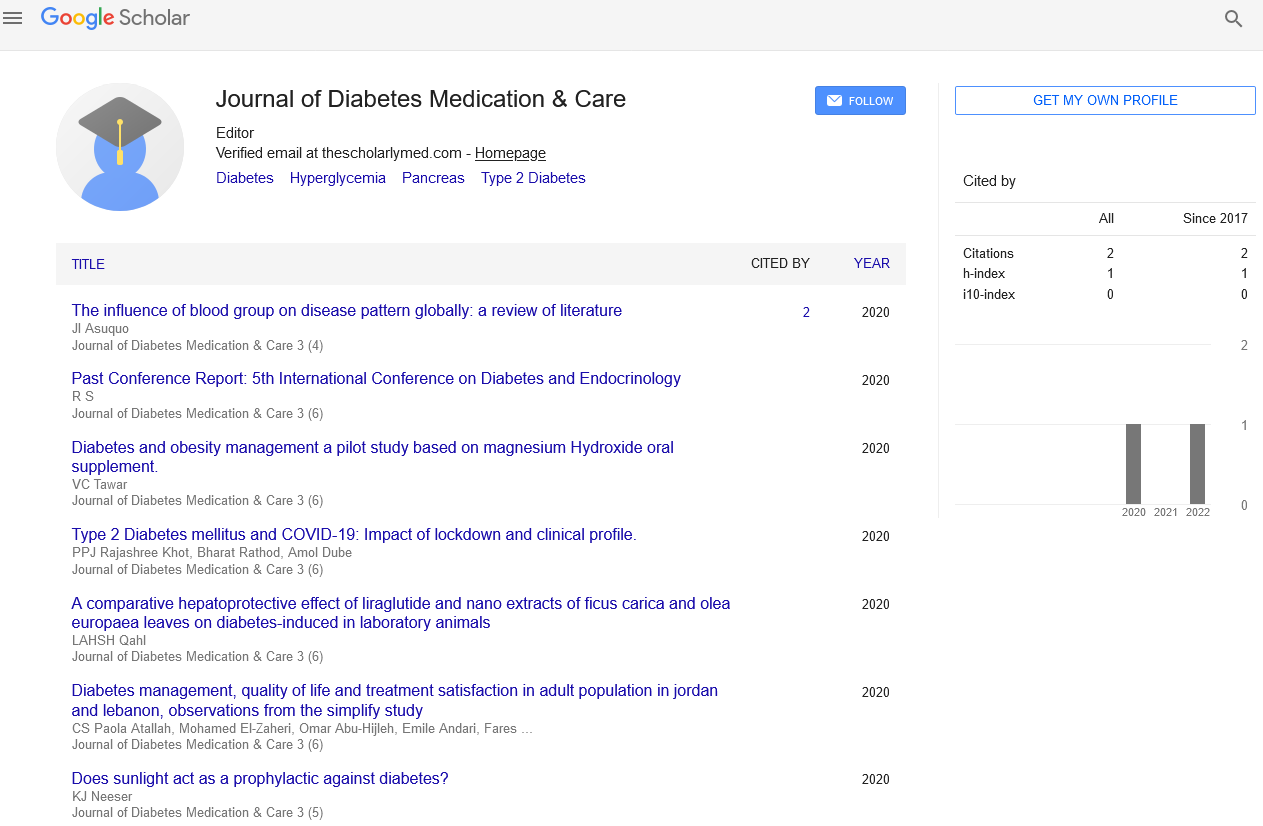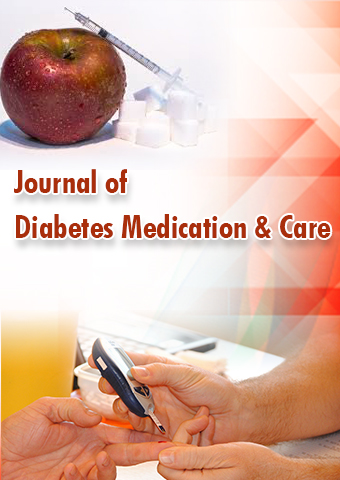Opinion Article - Journal of Diabetes Medication & Care (2024) Volume 7, Issue 1
Revolutionizing Type 1 Diabetes Treatment: The Promise of Oral Medications
- Corresponding Author:
- Bantrra Traatner
Department of Endocrinology, University of Medicine, Yangon, Myanmar
E-mail: bantrratraatner@bam.edu
Received: 05-Jan-2024, Manuscript No. JDMC-24-126491; Editor assigned: 10-Jan-2024, PreQC No. JDMC-24-126491 (PQ); Reviewed: 24-Jan-2024, QC No. JDMC-24-126491; Revised: 31-Jan-2024, Manuscript No. JDMC-24-126491 (R); Published: 09-Feb-2024, DOI: 10.37532/JDMC.2024.7(1).182-183
Introduction
Type 1 diabetes has long been managed through insulin injections, making it a lifelong challenge for those diagnosed with this autoimmune condition. However, recent breakthroughs in medical research have unveiled a potential game changer an oral medication that shows promising benefits in treating type 1 diabetes. This ground-breaking development not only brings hope to millions of individuals living with this condition but also opens new doors for more convenient and effective diabetes management.
Description
The challenge of type 1 diabetes
Type 1 diabetes is a chronic condition where the immune system mistakenly attacks and destroys insulin-producing beta cells in the pancreas. Insulin is crucial for regulating blood sugar levels, and its deficiency leads to a range of complications, including cardiovascular disease, kidney failure, and nerve damage. For decades, managing type 1 diabetes has primarily involved multiple daily insulin injections or the use of insulin pumps.
While these methods have been effective in controlling blood sugar levels, they come with challenges. The constant need for injections poses physical and psychological burdens on patients, impacting their quality of life. Moreover, achieving precise insulin dosing to match the body’s ever changing needs remains a complex task, often leading to episodes of hyperglycemia or hypoglycemia.
The emergence of oral medications
The development of an oral medication for type 1 diabetes represents a significant leap forward in the quest for more accessible and patient friendly treatments. Unlike insulin injections, which involve needles and potential pain, oral medications offer a non-invasive and more comfortable option for individuals with type 1 diabetes.
The oral medication under investigation targets the root cause of type 1 diabetes by modulating the immune system’s response. By suppressing the autoimmune attack on pancreatic beta cells, this innovative treatment aims to preserve insulin production and restore the body’s ability to regulate blood sugar levels naturally.
Benefits of the oral medication
Improved adherence: One of the primary advantages of oral medications is improved adherence to treatment regimens. Many individuals with type 1 diabetes, especially children and adolescents, may find it challenging to adhere to the routine of multiple daily injections. The convenience of an oral medication could lead to better compliance, ultimately enhancing overall diabetes management.
Reduced complications: By addressing the autoimmune aspect of type 1 diabetes, the oral medication has the potential to reduce the risk of complications associated with the condition. Preserving beta cell function may mitigate the long term effects of uncontrolled blood sugar levels, such as kidney disease, vision problems, and cardiovascular issues.
Enhanced quality of life: The shift from injections to oral medication may significantly improve the quality of life for individuals with type 1 diabetes. The elimination of needles and the associated pain and inconvenience can contribute to a more positive and fulfilling daily experience for patients.
Personalized treatment: The oral medication’s mechanism of action allows for a more personalized approach to type 1 diabetes treatment. By targeting the specific immune response of each patient, healthcare providers can tailor the medication to individual needs, potentially optimizing its effectiveness.
Challenges and considerations
While the prospect of an oral medication for type 1 diabetes is exciting, it is essential to acknowledge the challenges and considerations associated with its development and implementation.
Safety and side effects
Rigorous testing is crucial to ensuring the safety and efficacy of any new medication. Potential side effects and adverse reactions must be thoroughly evaluated to determine the risk-benefit ratio of the oral treatment. Long term studies are necessary to assess the medication’s impact on overall health and potential unforeseen consequences.
Cost and accessibility
The accessibility of the oral medication will play a pivotal role in its success. Affordability and insurance coverage will determine whether this innovative treatment option is accessible to a broad range of individuals with type 1 diabetes. Addressing cost concerns is essential to making the medication widely available and reducing health disparities.
Integration with current therapies
Integrating the oral medication into existing diabetes management strategies will require careful consideration. Healthcare providers need clear guidelines on when and how to incorporate the new treatment into individualized care plans. Compatibility with other medications and therapies must be thoroughly evaluated to ensure a seamless transition.
Patient education and support
Successful adoption of the oral medication will depend on effective patient education and support. Individuals with type 1 diabetes must understand the benefits, potential risks, and proper administration of the oral treatment. Healthcare professionals play a crucial role in guiding patients through this transition and providing ongoing support.
Conclusion
The development of an oral medication for treating type 1 diabetes marks a transformative moment in diabetes care. While insulin injections have been the mainstay of treatment for decades, this innovative approach offers the potential for a more patient-friendly and effective alternative. The benefits of improved adherence, reduced complications, enhanced quality of life, and personalized treatment highlight the positive impact this oral medication could have on individuals with type 1 diabetes.
However, it is essential to approach this development with cautious optimism, recognizing the challenges and considerations that come with introducing a new treatment modality. Rigorous research, thorough testing, and comprehensive patient education are critical components of the successful integration of the oral medication into diabetes management protocols.
As the medical community continues to explore and refine this ground-breaking treatment, the future holds promise for a paradigm shift in how type 1 diabetes is managed. The potential for an oral medication to revolutionize diabetes care offers hope not only for those currently living with the condition but for future generations who may benefit from more accessible and innovative treatments.

